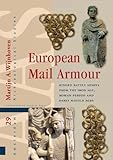European Mail Armour : Ringed Battle Shirts from the Iron Age, Roman Period and Early Middle Ages / Martijn A. Wijnhoven.
Material type: TextSeries: Amsterdam Archaeological StudiesPublisher: Amsterdam : Amsterdam University Press, [2021]Copyright date: ©2021Description: 1 online resource (520 p.)Content type:
TextSeries: Amsterdam Archaeological StudiesPublisher: Amsterdam : Amsterdam University Press, [2021]Copyright date: ©2021Description: 1 online resource (520 p.)Content type: - 9789048554294
- Armies -- History -- To 1500 -- Europe
- Military uniforms -- History -- To 1500
- Antiquity
- Archaeology
- Art and Material Culture
- History, Art History, and Archaeology
- Medieval Studies
- ANTIQUES & COLLECTIBLES / Military
- multi-dimensional approach to material culture, development and transition of technology military equipment long-term: Iron Age - Roman period - Middle Ages
- 355.14094
- online - DeGruyter
| Item type | Current library | Call number | URL | Status | Notes | Barcode | |
|---|---|---|---|---|---|---|---|
 eBook
eBook
|
Biblioteca "Angelicum" Pont. Univ. S.Tommaso d'Aquino Nuvola online | online - DeGruyter (Browse shelf(Opens below)) | Online access | Not for loan (Accesso limitato) | Accesso per gli utenti autorizzati / Access for authorized users | (dgr)9789048554294 |
Frontmatter -- Contents -- Acknowledgements -- 1 Introduction -- 2 The origins of mail armour -- 3 Distribution and archaeological context -- 4 The iconography of early mail armour -- 5 The naming of mail armour -- 6 Decoration in mail garments -- 7 Padded garments -- 8 The craft of making mail rings -- 9 Weaving patterns -- 10 The construction of mail garments -- 11 Ring characteristics -- 12 Final considerations -- Bibliography -- Database -- Appendix 1. Catalogue of mail armour -- Appendix 2. Catalogue of hybrid armour -- Appendix 3. Catalogue of isolated finds of fasteners and fixtures -- Appendix 4. Finds excluded from the database
restricted access online access with authorization star
http://purl.org/coar/access_right/c_16ec
Mail armour (commonly mislabelled 'chainmail') was used for more than two millennia on the battlefield. After its invention in the Iron Age, mail rapidly spread all over Europe and beyond. The Roman army, keen on new military technology, soon adopted mail armour and used it successfully for centuries. Its history did not stop there and mail played a vital role in warfare during the Middle Ages up to the Early Modern Period. Given its long history, one would think mail is a well-documented material, but that is not the case. For the first time, this books lays a solid foundation for the understanding of mail armour and its context through time. It applies a long-term multi-dimensional approach to extract a wealth of as yet untapped information from archaeological, iconographic and written sources. This is complemented with technical insights on the mail maker’s chaîne opératoire.
Mode of access: Internet via World Wide Web.
In English.
Description based on online resource; title from PDF title page (publisher's Web site, viewed 03. Jan 2023)


